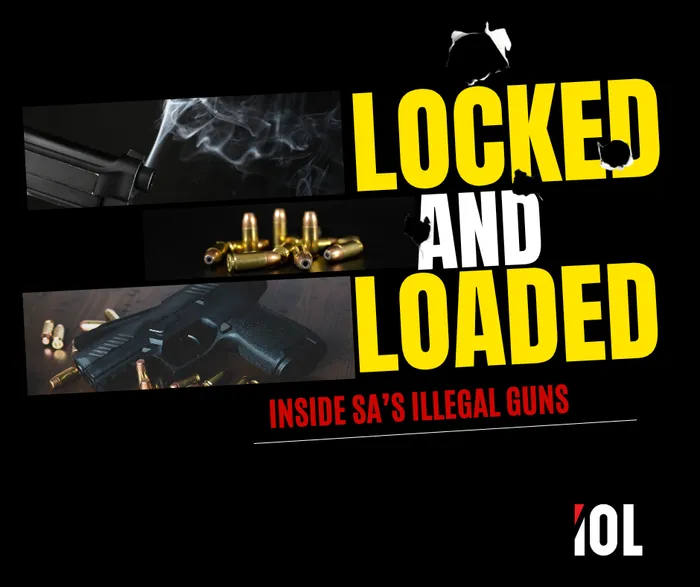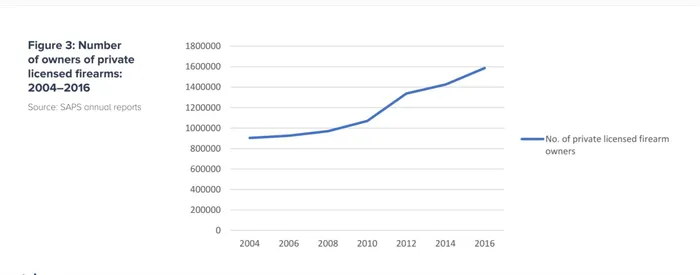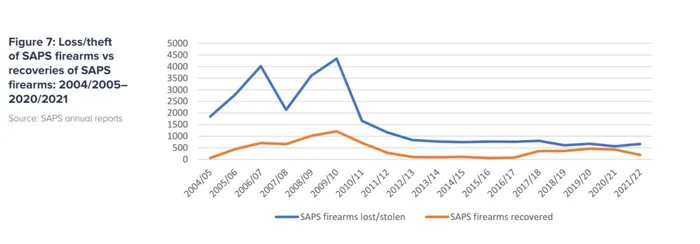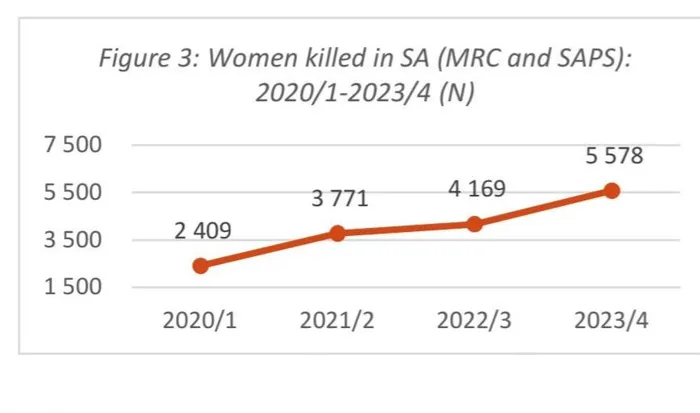Locked and Loaded: Inside the system turning legal guns into murder weapons

South Africa's struggle with gun violence is exacerbated by licensed firearms, which often fall into the hands of criminals, leading to gender-based violence, robbery, and murder.
Image: IOL Graphics
South Africa is notorious for violence that can rival those of countries at war. One of the methods in which this brutality is exacted is through firearms. Surprisingly, some of these are registered in an effort to curb violence but inevitably end up into the hands of criminals who go on to commit atrocities such as gender-based violence, robbery and murder.
Experts revealed to IOL that these guns, which are lawfully owned by citizens, private security organisations, and collectors, end up on the black market through theft, corruption, and licensing fraud.
How are firearms regulated in SA?
Firearm ownership in South Africa is tightly controlled under the Firearms Control Act 60 of 2000, which treats possession as a privilege rather than a right. The South African Police Service (SAPS), through the Central Firearms Registry (CFR), administers all licensing, background checks and renewals.
Applicants must first obtain a competency certificate proving knowledge of firearm law and safe handling before applying for an individual licence. Police also inspect the applicant's home to ensure the firearm will be stored in an approved safe.
The Act provides several licence categories, including Section 13 for self-defence and Section 15 for occasional hunting or sport shooting. Yet, despite all this, some guns fall through the cracks and end up taking innocent lives.
"Some criminal organisations have established private security companies as a means to acquire licensed firearms."
Dr Guy Lamb, a criminologist from the University of Stellenbosch believes that licensed civilian-held weapons are generally diverted into criminal hands by theft/robbery from the licensed owner or due to owner negligence.
"Licensed firearms that are part of deceased estates are particularly vulnerable to loss/theft," said Lamb. "'Criminals have also been able to acquire legal firearms through theft from private security companies (PSCs), with the most vulnerable PSCs for theft being those that have gone out of business and the firearms are not securely stored."
The academic went on to warn that the government firearms are also lost or stolen and used to commit crimes. "Some criminal organisations have established private security companies as a means to acquire licensed firearms," added Lamb.
Police corruption
In a 2022 report by Lamb, the Western Cape province, particularly Cape Town, has seen the majority of police corruption over the diversion of firearms to criminal gangs. Cape Town's murder rate rose from 43 per 100,000 in 2009/2010 to 69 per 100,000 in 2020/2021, representing a 60% rise.
Murder rates in South Africa's major cities varied between 36 and 41 per 100,000 people, with most declining or remaining stable over the same time period.

Firearm ownership in South Africa is tightly controlled under the Firearms Control Act 60 of 2000.
Image: Dr Guy Lamb

Dr Guy Lamb claims that the Western Cape province, particularly Cape Town, has seen the majority of police corruption over the diversion of firearms to criminal gangs.
Image: Guy Lamb
Gun Free South Africa's executive director, Dr Stanley Maphosa pointed out that civilians report around 23 guns lost or stolen daily, while police report about two daily.
"We see deliberate criminality where individuals facilitate theft or sell firearms illegally. A very small percentage of guns are smuggled into the country. The bottom line is that domestic legal gun stocks, both civilian and state-owned, are the biggest source of illegal firearms in South Africa," said Maphosa.
He criticised the government for not doing nearly enough to address the dire issue.
"We need much tighter controls over licensed firearms to prevent leakage, which means proper enforcement of the Firearms Control Act as well as amendments to close loopholes facilitating leakage.
"There must be real accountability for those who lose guns through negligence, and serious consequences for deliberate criminality. The government also needs to shift toward intelligence-led policing to recover illegal firearm; broad operations like Shanela simply aren't effective."
Legal guns driving GBV
A Medical Research Council (MRC) paper examined 20 years of femicide research in South Africa.
This, along with more recent police crimes, statistics demonstrate that women in South Africa are at the highest risk of being killed by their inmate partners. Firearms are the most commonly utilised weapon for murdering women, with the greatest recorded rate of fatal shootings.
As of 2023/4, an average of 15 women were murdered every day, up from 7 in 2020/1, according to crime statistics. Guns are the primary weapon used in these homicides. Since 2016, there has been a 58% increase in the number of gun licence applications, despite the fact that women are more likely to be killed by legal firearms.
In October, an inquest was initiated after the Brakpan Police Sergeant allegedly killed himself and his wife during a marital argument. Lizzy Suping, spokesman for the Independent Police Investigative Directorate (IPID), said that the incident occurred on Monday, August 25.
Suping stated that on the specific day in issue, the Station Commander of the Brakpan Police Station contacted the Sergeant, who was on assignment in Tsakane. The call's goal was to inform the Sergeant that his wife had secured a protection order against him, which needed to be served.
"The Station Commander also requested the Sergeant to hand over his firearm at the police station and provide proof afterwards," said Suping.
She went on to say that the wife chose to visit her parents' home following a meeting with police administration at the station. However, the Sergeant followed the wife to her parents' home, where he reportedly fired rounds that killed her, injured two children aged 15 to 13, the wife's mother, and their domestic helper.

Guns are the primary weapon used in these homicides.
Image: MRC and SAPS
Maphosa argued that South Africa should be gun free. "The evidence is clear, both in South Africa and globally more guns equal more gun violence and deaths. Guns are seven times more deadly than any other weapon," he said.
He claimed that since 2011, bad governance has allowed gun numbers to rise again, with 161,699 additional licensed firearms added between 2016 and 2023/24. And the country is back to 33 people being shot dead per day.
"The bottom line: guns are designed to kill, and if there were no guns, there would be no gun deaths."
CFR stuck in the 20th century
CFR, the unit responsible for processing firearm licences and renewals, has long been plagued by chronic understaffing and administrative backlogs.
Insiders say that the division operates with far fewer personnel than required to handle the country’s hundreds of thousands of firearm applications each year. This shortage has led to months-long delays in licence approvals and renewals, frustrating both gun owners and police officials tasked with enforcement.
Much of the CFR's work remains paper-based, despite repeated promises to modernise the system. Physical files are still stored in large archives at the registry's Pretoria headquarters, where records can easily be misplaced or damaged.
The absence of a reliable digital database has made it difficult for police to track the status of applications or verify ownership records quickly, a vulnerability that has drawn criticism from Parliament and gun rights groups alike.
Criminologist Thabang Bogopa told IOL that one of the issues that SAPS has is that it does not have enough inspectors.
"You can find that in one station; there is only one designated firearms officer (DFO) while the station is servicing approximately over 1,000 firearms," Bogopa said. "That is a disadvantage because they end up focusing on the administration meaning looking at new applications and making sure, they submit them to the next level."
He claimed that they may not be doing their jobs properly. "The Firearms Control Act requires that once per year, each licenced firearm holder be inspected to make sure that the firearm is still with them and whether the safe is still as it was when it was approved."
IOL News
Get your news on the go. Download the latest IOL App for Android and IOS now.
Related Topics: